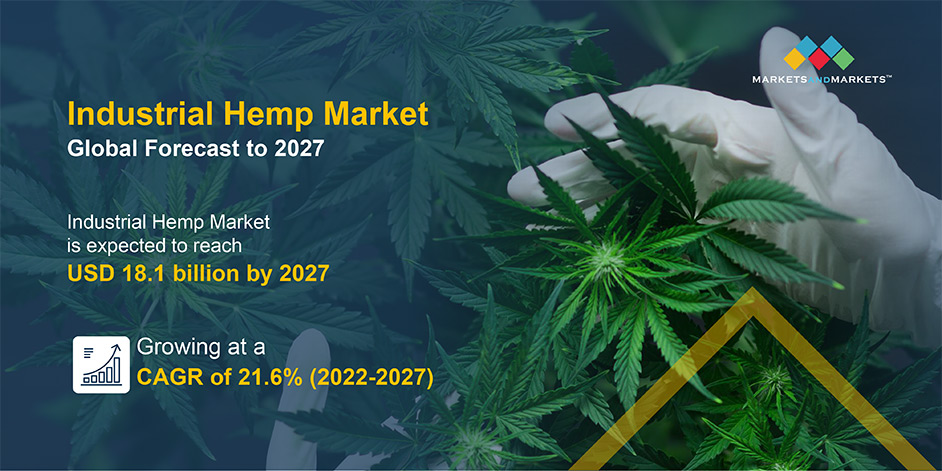
The global industrial hemp market size is estimated to be valued at USD 6.8 billion in 2022 and is projected to reach USD 18.1 billion by 2027, recording a CAGR of 21.6% in terms of value. The increased usage of hemp seeds in a wide range of food and beverage products such as cereals, yogurts, protein powders, and hemp milk is driving the market.
Request Sample Pages: https://www.marketsandmarkets.com/requestsampleNew.asp?id=84188417
Drivers and Opportunities
Driver: Increase in the legalization of industrial hemp
Hemp has been grown all over the world as a source of fiber and oilseed to make a variety of consumer and industrial products. Cannabis sativa L, which is not marijuana but a different variety of the same species, is the source of industrial hemp. Because of its name, consumers believe hemp has psychoactive properties. This factor has a negative impact on the hemp industry’s growth. The United States took several steps in the 2018 farm bill (a federal government agricultural and food policy tool) to legalize the production of hemp as an agricultural commodity and to remove it from the list of controlled substances; however, it cannot be grown as freely as other crops. The bill outlined actions that would be considered violations of the law, such as producing a plant with more than 0.3% THC (tetrahydrocannabinol) content or cultivating hemp without a license.
Opportunities: Innovative product development from industrial hemp
As hemp cultivation becomes more legal, manufacturers and research institutions are developing new products from industrial hemp. One such application is biofuel, which is expected to have significant growth potential in the coming years. With the rise in oil prices (diesel and gasoline), as well as growing concerns about global warming, biofuels have gained popularity. Hemp seed extracts are used to make hemp biodiesel, which is suitable for use in any diesel-powered vehicle. Additionally, hemp can be used to produce ethanol, which is currently produced from food crops such as wheat and corn. This would result in increased food production efficiency.
By application, food & beverage lead the application segment due to its versatility
Hemp is increasingly being used in food products because it contains essential fatty acids (linoleic and linolenic acid), vitamin E, and minerals such as phosphorus, potassium, sodium, magnesium, calcium, zinc, iron, and protein. Hemp is most consumed as hemp seed, either raw or roasted. Salads, smoothies, yogurt, and cereals all contain it. The increased consumption of plant-based protein due to the global popularity of veganism is expected to drive demand for hemp-based processed food products such as bars, flour, snacks, and cheese. Furthermore, due to the presence of highly digestible fiber, its role in improving digestion is expected to fuel its demand for food products. Hemp tortilla chips, hemp corn chips, and hemp hearts are some of the hemp-based snacks that are popular. Hemp is used as a breakfast cereal because of its nutrient-rich profile of essential fatty acids, which are required for proper body functioning.
Make an Inquiry: https://www.marketsandmarkets.com/Enquiry_Before_BuyingNew.asp?id=84188417
Europe accounted for the fastest growth in the industrial hemp market for the forecasted period
The European market is expected to account for the fastest growth in the industrial hemp market. The growth can be attributed to the increased usage of hemp seed and hemp seed oil in food, beverages, dietary supplements, and personal care products. Furthermore, the use of hemp fiber in a variety of applications, including automotive and construction materials for thermal insulation and soundproofing in automobiles is also driving the growth in Europe. Consumption of hemp seeds in food and other food products such as smoothies, yogurt, cereals, and bars is expected to drive market growth further. In countries such as Germany and the Netherlands, demand for hemp in the form of these products is extremely high, driving the regional market growth.
Key Players in the Market
The Major Players in Industrial Hemp Market are Marijuana Company of America Inc. (US), Cronos Group Inc. (Canada), Ecofibre Limited (Australia), Green Thumb Industries (US), Curaleaf Holdings Inc. (US), GenCanna (US), HempFlax BV (Netherlands), Konoplex Group (Russia), Hemp Oil Canada (Canada), BAFA (Germany), Dun Agro Hemp Group (Netherlands), Colorado Hemp Works (US), Canah International (Romania), South Hemp Tecno (Italy), and MH Medical Hemp GmbH (Germany).

